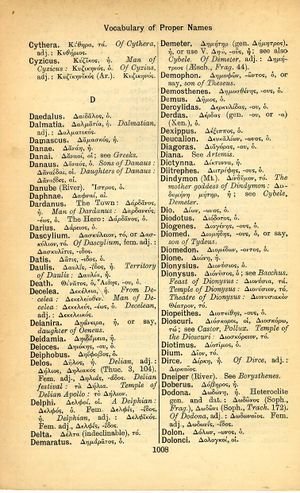Dionysus: Difference between revisions
ὃν οὐ τύπτει λόγος οὐδὲ ῥάβδος → if words don't get through, neither a beating will | if the carrot doesn't work, the stick will not work either | whom words do not strike, neither does the rod
m (Text replacement - "]]>" to "]]") |
(D_3) |
||
| Line 10: | Line 10: | ||
{{Lewis | {{Lewis | ||
|lshtext=<b>Dĭŏnȳsus</b>: or -os, i, m., = [[Διόνυσος]],<br /><b>I</b> the Greek [[name]] of [[Bacchus]] (not in the Aug. poets), Cic. N. D. 3, 21; 23; Att. ap. Macr. S. 6, 5; Plaut. Stich. 5, 2, 13; Aus. Epigr. 30.—<br /><b>II</b> Derivv.,<br /> <b>A</b> Dĭŏnȳsĭus, a, um, adj., of or pertaining to [[Bacchus]]; Dĭŏ-nȳsia, ōrum, n., = [[Διονύσια]], τά (sc. [[ἱερά]]), the [[festival]] of [[Bacchus]], in [[Greece]] [[celebrated]] [[every]] [[three]] years (Lat. Bacchanalia), Plaut. Curc. 5, 2, 45; id. Cist. 1, 1, 91; 1, 3, 8; id. Ps. 1, 1, 57; Ter. Heaut. 1, 1, 110 [[Don]].; id. ib. 4, 4, 11.—<br /> <b>B</b> Dĭŏnȳsĭas, ădis, f., a [[precious]] [[stone]], of a [[black]] [[color]], Plin. 37, 10, 57, § 157.—<br /> <b>C</b> Dĭŏnȳsĭăcus, a, um, adj., of or relating to [[Bacchus]]: ludi, i. q. [[Liberalia]], Aus. Ecl. de Feriis Rom. 29. | |lshtext=<b>Dĭŏnȳsus</b>: or -os, i, m., = [[Διόνυσος]],<br /><b>I</b> the Greek [[name]] of [[Bacchus]] (not in the Aug. poets), Cic. N. D. 3, 21; 23; Att. ap. Macr. S. 6, 5; Plaut. Stich. 5, 2, 13; Aus. Epigr. 30.—<br /><b>II</b> Derivv.,<br /> <b>A</b> Dĭŏnȳsĭus, a, um, adj., of or pertaining to [[Bacchus]]; Dĭŏ-nȳsia, ōrum, n., = [[Διονύσια]], τά (sc. [[ἱερά]]), the [[festival]] of [[Bacchus]], in [[Greece]] [[celebrated]] [[every]] [[three]] years (Lat. Bacchanalia), Plaut. Curc. 5, 2, 45; id. Cist. 1, 1, 91; 1, 3, 8; id. Ps. 1, 1, 57; Ter. Heaut. 1, 1, 110 [[Don]].; id. ib. 4, 4, 11.—<br /> <b>B</b> Dĭŏnȳsĭas, ădis, f., a [[precious]] [[stone]], of a [[black]] [[color]], Plin. 37, 10, 57, § 157.—<br /> <b>C</b> Dĭŏnȳsĭăcus, a, um, adj., of or relating to [[Bacchus]]: ludi, i. q. [[Liberalia]], Aus. Ecl. de Feriis Rom. 29. | ||
}} | |||
{{Gaffiot | |||
|gf=<b>Dĭŏnȳsus</b>¹⁶ ou <b>-ŏs</b>, ī, m. ([[Διόνυσος]]), Dionysos [nom grec de [[Bacchus]] : Cic. Nat. 3, 53 ; Dionyson [accus. grec] Aus. Epigr. 30. | |||
}} | }} | ||
Revision as of 06:52, 14 August 2017
English > Greek (Woodhouse)
Feast of Dionysus: Διονύσια, τά.
Temple of Dionysus: Διονύσιον, τό.
Theatre of Dionysus: Διονυσιακὸν Θέατρον, τό.
Latin > English (Lewis & Short)
Dĭŏnȳsus: or -os, i, m., = Διόνυσος,
I the Greek name of Bacchus (not in the Aug. poets), Cic. N. D. 3, 21; 23; Att. ap. Macr. S. 6, 5; Plaut. Stich. 5, 2, 13; Aus. Epigr. 30.—
II Derivv.,
A Dĭŏnȳsĭus, a, um, adj., of or pertaining to Bacchus; Dĭŏ-nȳsia, ōrum, n., = Διονύσια, τά (sc. ἱερά), the festival of Bacchus, in Greece celebrated every three years (Lat. Bacchanalia), Plaut. Curc. 5, 2, 45; id. Cist. 1, 1, 91; 1, 3, 8; id. Ps. 1, 1, 57; Ter. Heaut. 1, 1, 110 Don.; id. ib. 4, 4, 11.—
B Dĭŏnȳsĭas, ădis, f., a precious stone, of a black color, Plin. 37, 10, 57, § 157.—
C Dĭŏnȳsĭăcus, a, um, adj., of or relating to Bacchus: ludi, i. q. Liberalia, Aus. Ecl. de Feriis Rom. 29.
Latin > French (Gaffiot 2016)
Dĭŏnȳsus¹⁶ ou -ŏs, ī, m. (Διόνυσος), Dionysos [nom grec de Bacchus : Cic. Nat. 3, 53 ; Dionyson [accus. grec] Aus. Epigr. 30.

